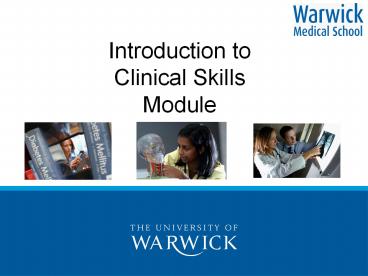Introduction to Clinical Skills Module - PowerPoint PPT Presentation
1 / 26
Title:
Introduction to Clinical Skills Module
Description:
Introduction to Clinical Skills Module * The rest of the session is going to run in the following way. You are going to observe a number of consultations portrayed by ... – PowerPoint PPT presentation
Number of Views:133
Avg rating:3.0/5.0
Title: Introduction to Clinical Skills Module
1
Introduction to Clinical Skills Module
2
Communication and Clinical Skills
- Dr Jane Kidd
- Associate Professor
- Clinical Communication
- j.m.kidd_at_warwick.ac.uk
3
Aims
- Introduce the Clinical Skills module
- Raise awareness of some of the communication and
clinical challenges you will meet - Consider how clinical skills are central to
effective practice
4
Outcomes
- List components of the clinical skills module
- List components of effective communication
- Identify skills to commence a consultation
effectively - Identify why awareness of feelings is important
- Identify some barriers to effective clinical
communication - List some solutions to problems
5
Clinical Skills
- Communication Component
- Dr Jane Kidd
- Clinical skills component
- Drs Vinod Patel and Linda Maxwell
- Inter-professional learning pathway
- Dr Ann Jackson
6
Clinical Skills Communication
- Phase 1
- Introduction
- Clinical Skills 1 and 2
- Inter professional Learning Programme
- Developing Interview Skills in the Consultation
(DISC)
7
Inter Professional Learning Why?
- Communication
- Collaboration
- Team working
8
Inter Professional Learning How?
- 1000 students
- 13 professional groups
- Interwoven online pathway
- Student discussions in virtual learning sets
- Patient based journey
- Weekly episodes and e-activities
9
- How many consultations do you think you will
conduct over your professional lives?
10
Diagnosis from History alone 85
Diagnosis after Examination only 5-10
Diagnosis after Investigation 5-10
So Good Communication Skills are central to
Clinical Medicine!
11
Effective communication 3 sets of skills
- Process
- Content
- Perceptual
- Silverman , Kurtz Draper, 2005
12
Recommended ReadingCommunication Skills
- Silverman, J, Kurtz, S., and Draper, J.
- Skills for Communicating with Patients, 2005
- Radcliffe Medical Press, Oxford
13
- I hear and I forget
- I see and I remember
- I do and I understand
- Chinese Proverb
14
Structure for next part of session
- Observe a consultation
- Discuss the questions with your neighbour
- Share your ideas with the group
15
Questions
- What do you think worked well?
- Why do you think the student is behaving in this
way? - What impact does the behaviour have on the
patient? - What could be done differently?
- What ethical issues do you think this
consultation raises?
16
Commencing the consultation
- Prepare
- Establish initial rapport
- Identify reasons for the consultation
- Silverman, Kurtz and Draper 2005
17
Preparation
- Environment
- - location, room, seating, desk
- Self
- Activities
- Emotions
- Silverman , Kurtz Draper, 2005
18
Establish initial rapport
- Greet patient
- Check/Obtain patients name
- Introduce self, role, nature of interview
- Obtain consent
- Empower patient to ask questions
- Demonstrate respect and interest
- Attend to patients physical comfort
- Explain confidentiality
- Mention note taking
- Silverman, Kurtz and Draper, 2005
19
Consider non-verbal aspects
- Calm approach
- Tone of voice
- Use of touch
- is a handshake appropriate?
- Personal space
20
Identify reasons for the consultation
- Open questions
- - allow patient to complete response
- Listen attentively/use active listening
- Use wait time/silence
- Confirm list and screen for further problems
- Negotiate agenda
- Silverman, Kurtz and Draper, 2005
21
Awareness of feelings
- Your own can impact on your effective
behaviours - Your patients differentiate thoughts from
feelings - - important for empathy
22
GMC Clinical and Communication Skills
Relationship with patient, History, Examination,
Problem Solving and Management
- Clinical Skills
- Interpret the results of commonly used
investigations. - Communication Skill
- Explain investigation
- Explain result
23
GMC Clinical and Communication Skills
Relationship with patient, History, Examination,
Problem Solving and Management
- Clinical Skills
- Work out drug dosage and record the outcome
accurately. - Write safe prescriptions for different types of
drugs. - Communication Skills
- Explain drug effects and side effects
- Write it up effectively
24
GMC Clinical and Communication Skills
Relationship with patient, History, Examination,
Problem Solving and Management
- Clinical Skills
- Give intramuscular and subcutaneous injections.
- Carry out arterial blood sampling.
- Perform suturing.
- Communication Skills
- Explain procedure
- Respond to patients emotions
25
GMC Clinical and Communication Skills
Relationship with patient, History, Examination,
Problem Solving and Management
- Clinical Skills
- Perform bladder catheterisation
- Communication Skills
- Explain need
- Explain procedure
- Be sensitive to patients needs
26
Solutions
- Get to know yourself
- prejudices, assumptions, values
- Identify your strengths and weaknesses
- Practice, practice, practice
- Get feedback on what you do
- Reflect on oops! learn from what you do
- Take every opportunity to learn
- Be self directed and find more!































